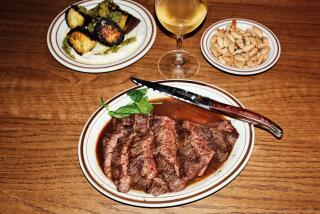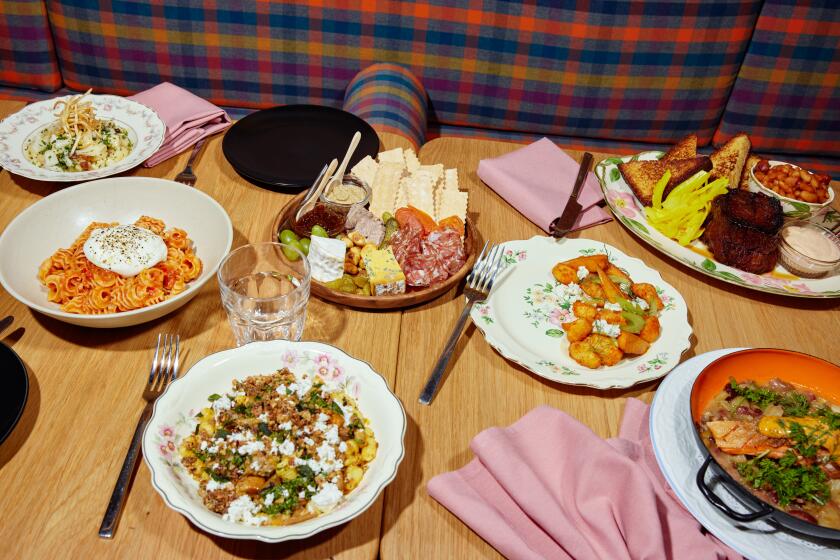Jamillah: Islamic Dishes of China
- Share via
TUSTIN — Slowly, almost imperceptibly, Orange County is catching up with the San Gabriel Valley as a place to find a first-rate Chinese meal. Newport Seafood in Santa Ana is a top Cantonese restaurant, and Taiwan Gourmet in Huntington Beach serves great Northern Chinese dishes. But perhaps no menu around here is quite as exotic as Jamillah Garden in Tustin, which features the delicious Islamic dishes of China.
Jamillah Garden is a spacious, brightly lighted cafe in the corner of a new mini-mall. Most of the customers appear to be Muslims, Chinese and otherwise, to judge from the high percentage of women wearing modest head cloths that leave only the face exposed.
The restaurant belongs to the Ma family of Taiwan, who also own the well-known China Islamic Restaurant in the huge San Gabriel Square mall. All food here is halal, meaning that it conforms to the dietary rules of Islam. Pork, a mainstay of Chinese cooking everywhere but in an Islamic kitchen, is not allowed on the premises.
The family dishes up a spare and savory cuisine, a combination of many styles and influences: a wonderful selection of hand-sliced noodles, peerless Northern-style dumplings, Shanghainese cold dishes, huge hot pots (called “warm pots” here) and plenty of lamb. The lamb dishes and warm pots probably originated in the western provinces of China bordering on Central Asia, in many districts of which Chinese- or Turkish-speaking Muslims predominate.
Practically everyone here orders se ma da bing, literally “big sesame flat bread.” This is the most impressive bread served in any Southland restaurant. It’s 14 inches in diameter and as thick as three double-crust pizzas, no kidding. The top is a sesame-dotted crust; beneath are about half a dozen puffy layers sprinkled with green onions.
Instead of sesame bread, you could order green onion pie, which consists of thin wheat flat breads stacked like tortillas. They too are laced with green onion. Both the sesame bread and the green onion pie go beautifully with the warm pots, such as lamb stew or mammoth oxtail stew.
The lamb stew warm pot is chunks of meat still on the bone stewed with the cabbage-like green qing cai in a rich, salty broth. The oxtail stew, which easily will serve at least four hungry people, is a Crock-Pot-sized earthenware dish filled with beefy, gelatinous chunks of oxtail, transparent bean thread noodles and big cubes of tofu in a wonderfully rich, rust-colored broth. These are hearty dishes. In the climate of western China, the cuisine cannot afford to be as light as the Chinese food with which most of usare familiar.
Still, there are lighter alternatives here, such as lamb with green onions--better described, perhaps, as gamy, delicately shredded lamb stir-fried with chopped green onions. This goes better with plain rice than with either of the breads.
Many of the cold dishes also are on the light side. The spicy beef is as lean and moist as any I’ve had in a long time, and the spicy ox tripe is fired up with lots of hot pepper. Chicken and ground green bean sheets turns out to be a sort of Chinese chicken salad in a ground peanut dressing.
Noodle dishes are big everywhere in China and Central Asia. Here they use thick wheat noodles with a pronounced al dente bite, hand-cut into homey, irregular shapes. These are cooked in a wok with scrambled egg and a choice of meat (I like them with either lamb or shrimp).
Steamed dumplings, too, are popular throughout the area. Inside each chewy, slightly doughy dumpling at Jamillah Garden is a juicy clump of minced beef (instead of the customary lamb).
The eggplant in spicy sauce is a gigantic portion of sliced eggplant tossed in a wonderfully complex, subtly spicy brown sauce. Hot braised shrimp is an equally generous serving, but perhaps its sauce is a little sweeter than necessary. Dry sauteed string beans is a vegetarian version that substitutes salty bits of pickled radish for the more usual ground pork; it is a nearly perfect dish.
If someone in your party reads Chinese, you can explore the Chinese-language blackboard menu. Or come when the place isn’t too busy--the owners are happy to translate the Chinese characters, time permitting.
One good item from that menu is the tofu omelet in brown sauce, a round of tofu covered with a blanket of fried egg. Another is the hollow, reedy green vegetable called kang xin cai, cooked in hot oil with minced garlic. But I’ll pass on the tea-smoked duck. It has an intense flavor, but the meat is deep fried and unacceptably oily.
One nice thing about eating in halal restaurants is that you can be confident that the food is clean and fresh in order to conform with Islamic dietary standards. In the case of Jamillah Garden, there is the added kick of eating really exotic foods in the wilds of Tustin, far from the industrial cities of Taiwan, farther still from the vast, empty steppes of western China.
Jamillah Garden is moderately priced. Lunch specials are $4.50 to $5.25. Dim sum are $1.25 to $5.50. Warm pots are $9.50 to $14.50. Main dishes are $5.50 to $11.95. Homemade noodles are $4.95 to $5.95.
* JAMILLAH GARDEN
* 2512 Walnut St., Tustin.
* (714) 838-3522.
* 11 a.m.-3 p.m., 4:30-9 p.m. daily.
* Visa, MasterCard.
More to Read
Eat your way across L.A.
Get our weekly Tasting Notes newsletter for reviews, news and more.
You may occasionally receive promotional content from the Los Angeles Times.










